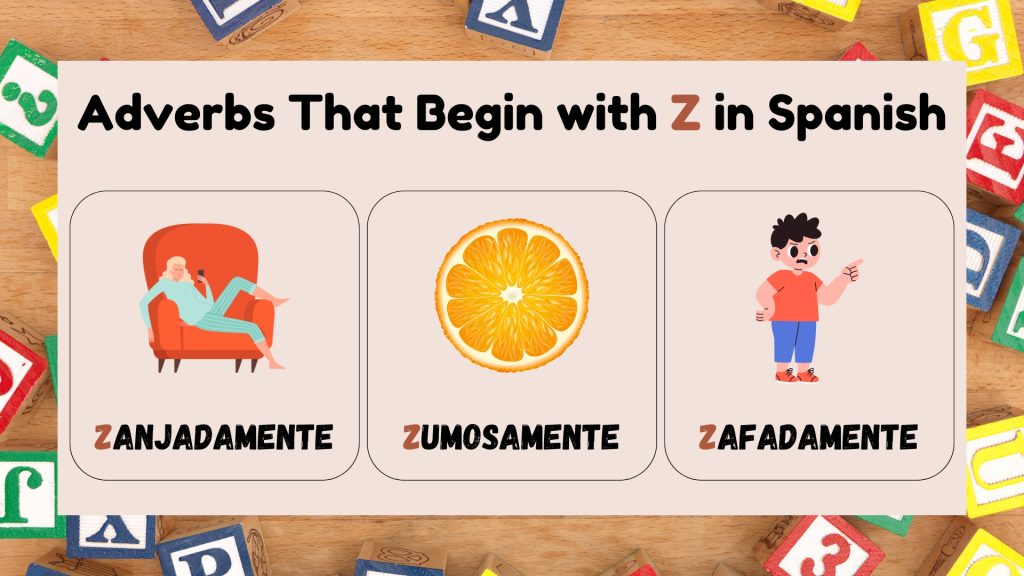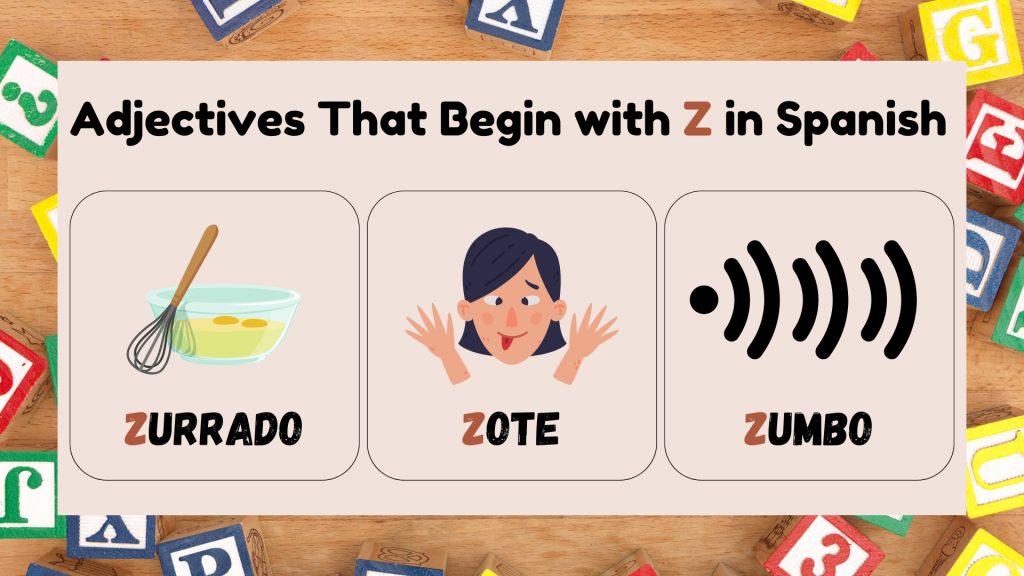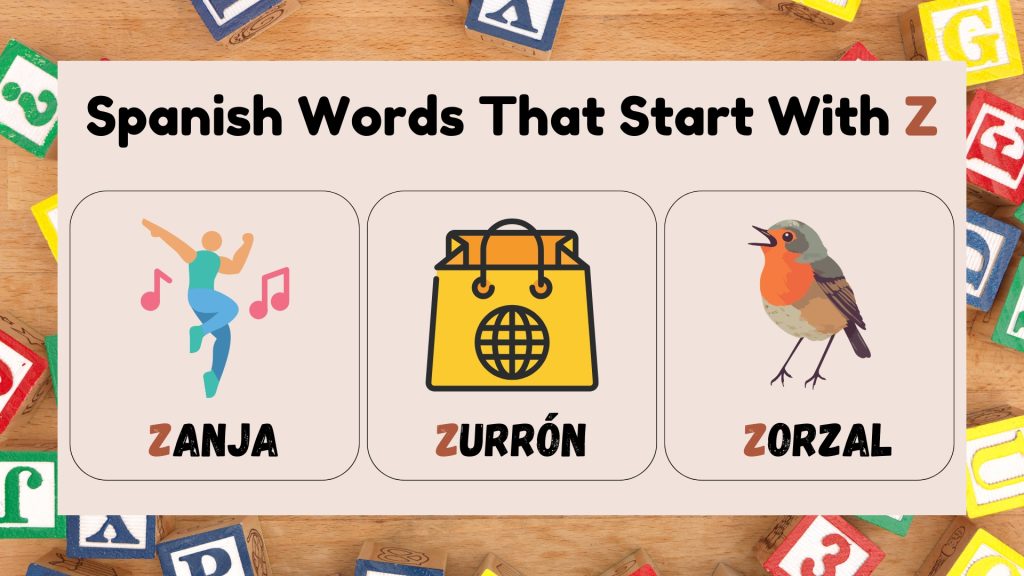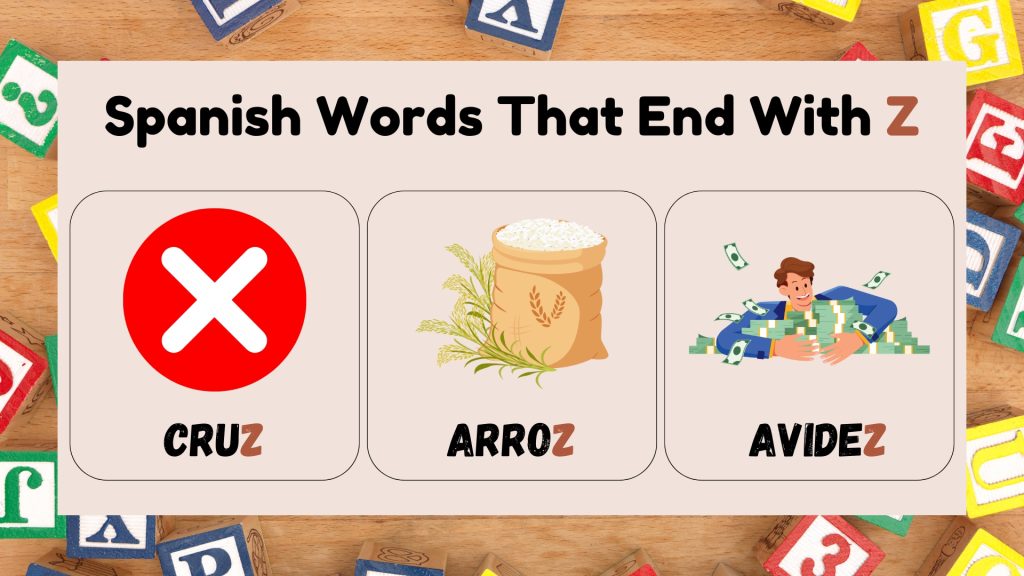When you dive into Spanish words starting with ‘Z’, like ‘zarpar’ or ‘zurcir’, it’s more than just a list of terms. Each word holds its own story, reflecting the culture and history from which it comes.
It’s fascinating to think about how these words show us more about Spanish language and society. Digging deeper into their sounds and origins could teach us a lot about how Spanish has evolved.
What might we discover about the forces that have shaped the Spanish language?
The History of the Letter Z in the Spanish Alphabet
The letter Z started out as the Phoenician letter zayin. From there, it moved through Greek and Roman hands before landing in the Spanish alphabet.
It’s a rare but important letter, showing up in just 0.5% of Spanish words. Its journey from culture to culture adds a special flavor to its role in language, making it more than just a letter.
Nouns That Begin with Z in Spanish
When we look at Spanish nouns starting with ‘Z,’ we find words like ‘zapato’ (shoe) and ‘zoológico’ (zoo). These words not only build our vocabulary but also give us a glimpse into the culture.

There are other interesting ones too, like ‘zarzamora’ (blackberry), ‘zumbido’ (buzz), and ‘zarzuela’ (a type of Spanish musical theater). Each of these words brings to life different elements of Spanish-speaking communities, from everyday objects to nature and the arts.
| Word | Meaning |
|---|---|
| Zanahoria | Carrot |
| Zarza | Blackberry bush |
| Zapato | Shoe |
| Zorro | Fox |
| Zángano | Drone (male bee) / Lazy person |
| Zarzuela | A type of Spanish opera |
| Zurrón | Shepherd’s bag |
| Zambomba | A friction drum used in Spanish music |
| Zarcillo | Earring or vine tendril |
| Zanja | Ditch or trench |
| Zodiaco | Zodiac |
| Zepelín | Zeppelin (airship) |
| Zurrapa | Sediment or dregs (from food or drinks) |
| Zaguán | Entryway or hallway |
| Zoquete | Blockhead or dunce |
| Zambullida | A dive into water |
| Zascandil | Troublemaker or mischief-maker |
| Zurrón | A rough or rustic person (colloquial) |
| Zurrapa | Food leftovers or scraps |
| Zahúrda | Pigsty or filthy place |
| Zarandaja | Trivial thing or nonsense |
| Zumbo | A loud noise or buzz |
| Zumbido | Buzzing or ringing sound |
| Zarco | Light blue or grayish eyes |
| Zurra | A beating or thrashing |
Verbs That Begin with Z in Spanish
Spanish verbs starting with ‘Z’ are quite vivid. For example, ‘zambullirse’ means to dive. Another one, ‘zurcir,’ means to darn. These verbs add a lot of flavor to the language.
‘Zigzaguear’ means to zigzag, which brings a touch of unpredictability. Then there’s ‘zampar,’ meaning to gobble, perfect for describing quick eating.

Also, ‘zambullir’ means to submerge, expanding the range of water-related actions you can express.
| Word | Meaning |
|---|---|
| Zambullirse | To dive or plunge into water |
| Zarpar | To set sail |
| Zumbar | To buzz or hum |
| Zigzaguear | To zigzag |
| Zurrar | To thrash or scold |
| Zanganear | To laze around or loaf |
| Zampar | To gobble up food quickly |
| Zapatear | To stomp or tap dance |
| Zurear | To coo like a dove |
| Zurcir | To mend or sew together |
| Zozobrar | To capsize or sink |
| Zarandear | To shake or toss around |
| Zumear | To give off a smell or fume |
| Zanjar | To settle a dispute or dig a ditch |
| Zambalearse | To stagger or wobble |
| Zascandilear | To loiter or waste time |
| Zapatelear | To kick repeatedly |
| Zanganear | To act lazily or wander aimlessly |
| Zampar | To stuff oneself with food |
| Zarandillar | To toss something lightly |
| Zumbarse | To play a prank or joke on someone |
| Zurrarse | To get scared or wet oneself |
| Zahar | To examine carefully |
| Zancajear | To take long strides |
| Zanclar | To hook or latch onto something |
Mastering Spanish Verb Moods: Subjunctive vs. Indicative Explained!
Adverbs That Begin with Z in Spanish
Adverbs starting with ‘Z’ are not common in Spanish, but they are important. They usually come from other words and help change verbs, adjectives, or other adverbs. This makes descriptions and actions more detailed in both talking and writing.

It’s a neat little trick of the language, right? It adds that extra touch to what you’re saying or writing.
| Word | Meaning |
|---|---|
| Zozobrantemente | In a sinking or failing manner |
| Zancudamente | Like a long-legged person or insect |
| Zorrosamente | Cunningly or slyly |
| Zumbonamente | Mockingly or teasingly |
| Zarrapastrosamente | Sloppily or messily |
| Zanjudamente | With exaggerated cleverness |
| Zarandeadamente | In a shaken or tossed way |
| Zambullidamente | With a deep dive |
| Zumosamente | In a juicy or pulpy way |
| Zarzueleramente | In a theatrical or dramatic way |
| Zanganamente | Lazily or idly |
| Zigzagueantemente | In a zigzag manner |
| Zancladamente | Firmly hooked or latched |
| Zascandileadamente | In a wandering or mischievous way |
| Zarrapastrantemente | In a ragged or unkempt way |
| Zanjadamente | With a definite conclusion |
| Zumbadoramente | Buzzingly or hummingly |
| Zapateadamente | With a rhythmic stomping |
| Zumbatadamente | In a crazy or wild way |
| Zampeadoramente | Greedily or voraciously |
| Zarateadamente | In a jerky or sudden way |
| Zarcosamente | With a bluish tint |
| Zurcientemente | Skillfully mended or fixed |
| Zampeantemente | Hastily or recklessly eating |
| Zafadamente | In an impudent or rude manner |
Adjectives That Begin with Z in Spanish
Adjectives starting with ‘Z’ in Spanish really make the language stand out. They help paint vivid pictures and add unique touches to descriptions.
Let’s take a few examples: ‘zalamero’ means someone who flatters a lot, ‘zurdo’ is used for left-handed people, and ‘zafio’ describes someone who’s a bit crude.

These words are super helpful in making conversations and writing in Spanish more colorful and precise.
| Word | Meaning |
|---|---|
| Zafio | Uncouth or crude |
| Zanquilargo | Long-legged |
| Zurrón | Rough or coarse |
| Zahareño | Wild or untamed |
| Zahorí | Clairvoyant or insightful |
| Zurdo | Left-handed |
| Zorongo | Relating to a folk dance |
| Zanfonista | Relating to someone who plays the hurdy-gurdy |
| Zanahorio | Carrot-colored (used for redheads) |
| Zumoso | Juicy |
| Zangolotino | Immature adult |
| Zarco | Bluish or gray-eyed |
| Zonzo | Dull-witted or foolish |
| Zurrado | Beaten or worn-out |
| Zanquebrado | Bow-legged or unsteady |
| Zascandil | Mischievous or restless |
| Zigzagueante | Zigzagging or meandering |
| Zarrapastroso | Sloppy or unkempt |
| Zote | Clumsy or foolish |
| Zangoloteado | Shaken or jolted |
| Zumbo | Resonating or echoing |
| Zaparrastroso | Dirty or ragged |
| Zarrapastroso | Shabby or rundown |
| Zamacueca | Related to a South American folk dance |
| Zarista | Monarchist or pro-czar |
Awesome Spanish Words Beginning with A You Should Know!
Spanish Words That Start With Z
Exploring Spanish words that start with ‘Z’ shows how diverse the language is.
You have nouns like ‘zapato’ for shoe and ‘zoológico’ for zoo.
Then there are verbs like ‘zambullirse’ meaning to dive, and ‘zigzaguear’ which is to zigzag.
Don’t forget adjectives, ‘zalamero’ refers to a flatterer and ‘zurdo’ means left-handed.

Each word adds its own flavor to the conversation, reflecting unique cultural and everyday uses.
| Word | Meaning |
|---|---|
| Zanja | A trench or deep groove |
| Zurriburri | A confusing mix of things |
| Zopenco | A foolish person |
| Zamarrón | A heavy coat or cloak |
| Zurrón | A shepherd’s bag |
| Zahúrda | A filthy place |
| Zancudo | A mosquito (in Latin America) |
| Zaragata | A commotion or loud fight |
| Zaqueo | A historical tax collector |
| Zanate | A type of blackbird |
| Zorruno | Fox-like or cunning |
| Zarramplín | A shabby-looking person |
| Zambombazo | A loud explosion or impact |
| Zumbón | A joker or prankster |
| Zafra | The sugarcane harvest season |
| Zampoña | A pan flute from the Andes |
| Zamuro | Another word for vulture |
| Zote | A clumsy fool |
| Zorzal | A type of songbird |
| Zurrapato | Someone rough or crude |
| Zagalón | A grown but awkward young man |
| Zanclo | Hook-shaped |
| Zaparro | A rough person or brute |
| Zampón | A gluttonous person |
| Zurragazo | A hard hit or blow |
Spanish Words That End With Z
Many Spanish words end with the letter ‘Z’. For example, ‘luz’ means light, ‘voz’ means voice, and ‘nariz’ means nose. These words are pretty common when you chat in Spanish.

There are also words like ‘feliz’, which means happy, and ‘capaz’, which means capable. These words help you express feelings and abilities more clearly in Spanish, whether you’re talking or writing.
| Word | Meaning |
|---|---|
| Luz | Light |
| Cruz | Cross |
| Voz | Voice |
| Pez | Fish |
| Arroz | Rice |
| Lápiz | Pencil |
| Juez | Judge |
| Paz | Peace |
| Matiz | Shade or nuance |
| Raíz | Root |
| Ajolotez | Axolotl (rare form) |
| Otravez | Again (archaic) |
| Avidez | Greed |
| Nitidez | Clarity or sharpness |
| Directriz | Guideline |
| Maciz | Solid or compact (rare) |
| Albiz | White coloration (old usage) |
| Capataz | Foreman or overseer |
| Feraz | Fertile or productive |
| Rapidez | Speed |
| Esquiz | Schizoid (psychology term) |
| Estiliz | Stylization (rare) |
| Validez | Validity |
| Rigidez | Rigidity |
| Vejez | Old age |
Conclusion
To sum it up, the letter ‘Z’ in Spanish brings something special to the language. It shows up in nouns, verbs, adjectives, and adverbs, making the vocabulary rich and varied.
Diving into these words helps us get a better grip on how the language works and gives us a peek into the diverse cultures that speak Spanish.
Knowing these words well can really boost your fluency and make your Spanish more vivid and fun, whether you’re talking or writing.
Start Your Language Learning Journey with Lingua Viva Now!
Dayron is co-owner, and the heart of Lingua Viva. He is a licensed Educator and Interpreter with 15+ years of experience, and holds a graduate degree in Foreign Language Instruction. A native Caleño who creates a comfortable environment for his students. Dayron is loved by all and inspires confidence in his students when learning and speaking Spanish. He is also an avid comedian that loves to dance salsa.











